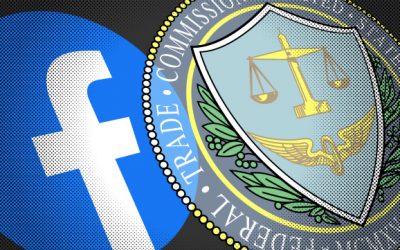
TECHNOLOGY
Latest Technology Posts
The Facebook Files Follow-Up: Facebook’s Terrible, Horrible, No Good, Very Bad Week
Brief #64 – Technology
By Scout Burchill
Frances Haugen, the whistleblower behind the Wall Street Journal’s hugely-consequential Facebook Files (see Brief #64 for more details) took center stage earlier this month, revealing her identity in a primetime interview with CBS’s 60 Minutes before testifying in front of Congress in a series of high-profile hearings. Haugen’s revelations, coupled with an hours-long complete blackout of all Facebook-owned platforms, added up to one of Facebook’s worst weeks ever.
The Facebook Files: A Clarion Call for Real Accountability and Transparency
Brief #63 – Technology
By Scout Burchill
A remarkable investigative series published last month by the Wall Street Journal reveals the profound, and deeply disturbing, ways Facebook is warping our society. The Facebook Files, as they are called, expose bombshell revelations about the harms the biggest social media company in the world knowingly perpetrates. While much ink has been spilled on this topic before, the Facebook Files are already shaping up to be the most damning scandal to rock the company since Cambridge Analytica.
Apple’s New Child Sexual Abuse Material Detection System: Responsible Prevention or Dangerous Precedent?
Brief #62 – Technology
By Scout Burchill
Earlier this month, Apple announced three new features to protect children and crack down on child sexual abuse material (CSAM). While these new features, which will be rolled out on all iPhone and iPad devices in the coming months, may be well-intentioned, a number of security researchers and civil rights groups are raising the alarm about their potential to open the floodgates to increasing government and corporate surveillance.
No One is Safe From the Data Brokerage Industry
Brief #22 – Technology
By Scout Burchill
While you may not be familiar with the shadowy world of the data brokerage industry, there’s a good chance that it knows a lot about you. Data brokers are the unsavory middlemen in our rampant, unregulated surveillance economy. In short, they collect, purchase and aggregate our personal data from the smartphone applications we use and then refine, re-package and sell it for profit. A recent scandal involving the outing of a closeted Catholic priest validates critics’ worst fears about this predatory industry: no one is safe.
Star Wars: The Weaponization of Space
Brief #60 – Technology
By Henry Lenard
Even as space commerce soars to new heights, it appears the world continues to gird itself for the inevitability of warfare in the heavens. At the official opening of the new UK Space Command on July 30, two top British military officers directly criticized China and Russia for their “reckless” behavior in space, such as using weapons to destroy satellites. That activity has left a trail of dangerous space debris in Earth’s orbit.
The two commanders also left open the possibility that the UK could develop its own weapons to defend assets in space for the first time.
Space Tourism Puts Focus Back on Commercialization of the Outer Limits
Brief #59 – Technology
By Henry Lenard
The successful space tourism flights of Richard Branson aboard his Virgin Galactic craft and Jeff Bezos on his Blue Origin rocket have drawn new attention to what is happening in the skies above us. It also has many asking the question who has oversight of commercial ventures in space.
Spyware Technology: A Global Threat top Democracy and Human Rights
Brief #58 – Technology Policy
By Scout Burchill
A flurry of articles have recently been published on the Israeli based cyber-surveillance company NSO Group thanks to a recent leak exposed by Forbidden Stories, a collaborative non-profit journalist organization, which revealed a list of about 50,000 phone numbers alleged to have been targeted by the company’s Pegasus surveillance software.
Global Perspectives: Nigeria: A Case Study In The Slow Creep of Digital Authoritarianism
Brief #57 – Technology
By Scout Burchill
On June 4th, the Nigerian government announced an “indefinite suspension” of Twitter after the social media company deleted a controversial tweet by Nigerian President Muhammadu Buhari. The Nigerian government’s Twitter ban and its recent history of attempts to more stringently regulate online speech present a cautionary tale about the rise of digital authoritarianism.
Big Tech Antitrust Efforts Take a Step Forward
Brief #56 – Technology
By Scout Burchill
The world of antitrust and Big Tech regulation has been brimming with developments lately, and all signs point to a transformational shift underway in Washington. Last month, in a rare show of bipartisanship, the Senate voted overwhelmingly to approve Lina Khan’s nomination to the Federal Trade Commission.
U.S., U.K. Warn of Ongoing Russian Hacking Efforts
Brief # 53 – Technology Policy
By Henry Lenard
U.S. and British government agencies released details on July 1 of an ongoing cybersecurity threat linked to Russia’s military intelligence agency GRU against hundreds of government agencies, energy companies and other organizations worldwide.
Federal Judge Dismisses Facebook Antitrust Cases
Brief # 52 – Technology
By Henry Lenard
Two antitrust cases filed against Facebook Inc. by the U.S. Federal Trade Commission and a coalition of nearly all state attorneys general led New York’s Letitia James were dismissed by Judge James E. Boasberg of the U.S. District Court of the District of Columbia on June 28, 2021.
A Review of Current Assistive Technology Policy in the United States
Brief # 51 – Technology
By M.J. Conaway
In the United States, there are several Federal laws that address technology accessibility for people with disabilities, including the American with Disabilities Act, the Telecommunications Act and Section 508 of the Rehabilitation Act. The U.S. Access Board develops accessibility standards for the various technologies covered by the laws, which have been incorporated into the procurement regulations of the Federal government.
It’s Time to Start Taking UFOs Seriously
Brief # 50 – Technology
By Scout Burchill
By the end of this month a long-anticipated report will be released by the U.S. Intelligence community on UFOs. A once fringe, conspiracy-laden topic, Unidentified Aerial Phenomena, or UAPs as they are called by the Pentagon, have infiltrated the Washington establishment as of late and captured the fascination of the wider public.
Global Perspectives: India’s Draconian New Digital Media Laws and the Responsibilities of U.S. Tech Companies
Brief # 49 – Technology
By Scout Burchill
In late May, the Indian government enacted sweeping new laws to regulate social media companies and digital platforms. The laws will require digital content providers, from Twitter and Facebook to Netflix and independent news organizations, to remove content that government authorities find objectionable within 36 hours of being flagged.
Facebook Extends Trump Ban For 2 Years
Brief # 48 – Technology
By Scout Burchill
After an initial review from the Oversight Board, Facebook finally announced the company’s decision on the fate of former president Donald Trump’s account. In a blog post, the Facebook Vice President of Global Affairs Nick Clegg responded to the Oversight Board’s charge that the company’s initial decision of an indefinite punishment was ‘not appropriate’ by announcing that Trump’s ban would be in effect for 2 years starting from January 7th.
Trump’s Comically Bad Communications Platform and the Power of Engagement and Deplatforming
Brief #47—Technology
By Scout Burchill
After four months of radio silence, former president Donald Trump is back in the social media game, sort of. After hyping a return on a platform of his own, Trump finally launched a new section on his website called From the Desk of Donald J. Trump, touting it as “a place to speak freely and safely.” Billed as a “communication platform,” the new feature on his website is basically a micro-blog that Trump uses to post messages in his trademark Twitter style.
Facebook’s Oversight Board Upholds Trump Ban but Criticizes Indefinite Punish-ment
Brief #46—Technology
By Scout Burchill
On Wednesday, May 5th, Facebook’s Oversight Board issued its much anticipated ruling on the social media platform’s indefinite ban of former President Donald Trump for his posts following the January 6th riots at the Capitol. After a week-long delay due to over 9,000 public comments on the case, the Oversight Board decided to uphold Facebook’s initial decision to suspend Trump.
However, in the nearly 12,000 word ruling, the Board made absolutely clear that the indefinite suspension is “not appropriate” as it constitutes an “indeterminate and standardless penalty.” On this issue, the Board did not mince words in reprimanding Facebook’s arbitrary punishment. The Board wrote, “in applying a vague, standardless penalty and then referring this case to the Board to resolve, Facebook seeks to avoid its responsibilities.”
Ransomware on the Uptick: A Clear and Present Danger
Brief #45—Technology
By Charles A Rubin
The Colonial Pipeline Company, which describes itself as “the largest refined products pipeline in the United States” transporting gas and jet fuel through a pipeline system spanning 5,500 miles between Texas and New Jersey reported on Friday May 7 that it was the victim of a ransomware cybersecurity attack. The company assured the public that the attack had only affected its information technology systems and not its operation capacity but, as a precaution, it was proactively taking certain systems offline to contain the threat. The action temporarily halted all pipeline operations effectively cutting supplies to much of the Eastern seaboard.
New Top Dogs, Same Old Tricks: Uncovering the Power of Big Tech, Part 1 Washington’s Biggest Influencers
Brief #44—Technology
By Scout Burchill
Move over Big Oil and Big Tobacco. According to a new report by Public Citizen, Big Tech companies now run the largest lobbying operations in Washington. For the first time ever, Facebook and Amazon topped the 2020 list of individual corporate lobbying spenders. Facebook spent close to $20 million and Amazon was not far behind spending close to $19 million, about 30% more than Comcast Corporation, the third highest spender. Since 2018, Amazon and Facebook have increased their spending by 30% and 56%, respectively.
These sums only represent reported federal lobbying dollars. Additional spending to gain influence through campaign contributions, Super Pacs, advertising campaigns, research funding, non-profits, associations, federations or trade groups, as well as state, local and international political spending are not included. Taking reported campaign contributions into account, Amazon and Facebook spent a combined $124 million in lobbying and campaign contributions during the 2020 election cycle alone.









